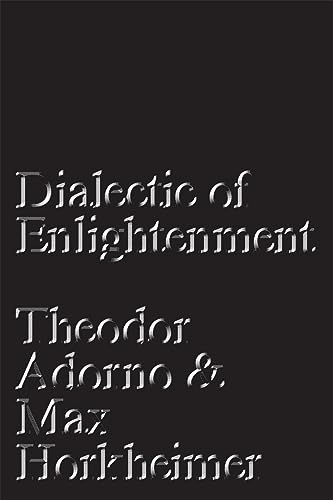Dialectic of Enlightenment
Theodor W. Adorno; Max Horkheimer
BOOK REVIEW

In the midst of a world wrestling with the debris of enlightenment, Dialectic of Enlightenment emerges as a clarion call for a radical reevaluation of our modernity. Written by the philosophical titans Theodor W. Adorno and Max Horkheimer, this seminal text, forever entangled with the shadows of critical theory, is not just a book; it's a profound confrontation with the very fabric of our existence, our thoughts, and the undercurrents of the society we inhabit. As we traverse the chasms of enlightenment thought, you'll find yourself enraptured by a discussion that is both terrifying and exhilarating. What if the enlightenment, that glorious beacon of reason and progress, is also the progenitor of our enslavement? What if the very tools we harness for liberation turn upon us, binding us in chains of conformity?
Published in the twilight of the post-World War II era, this work pulsates with urgency, echoing the disillusionment that swept across Europe as it stumbled from conflict into the stark shadows of capitalist consumerism. The authors, both exiles from Nazi Germany, lingered in the thick air of a world that had betrayed reason, scrutinizing the sickly tendrils of the very enlightenment that had promised progress. With a keen edge, they dissect the dialectical relationship between culture and society, exposing the insidious ways that rationality can spiral into domination. It's a fierce reminder that the seeds of enlightenment can bloom into both flowers of freedom and weeds of oppression, leaving us grappling with the question: are we truly free, or merely prisoners within the walls we've built ourselves?
Reading this work is akin to standing at the crossroads of reason and myth. Adorno and Horkheimer assert that the enlightenment's rationality, originally a liberating force, has devolved into a mechanism for control-a critique echoed by contemporary thinkers who navigate the fragile landscapes of today's consumer culture. 💥 The wheels of late capitalism grind perilously close to our souls, stripping away individuality in favor of a homogenized existence where theoretical knowledge has morphed into a tool for manipulation. As the authors powerfully remark, "Myth is already enlightenment, and enlightenment reverts to mythology." Such potent assertions resonate now more than ever, thrusting readers into a confrontation with our societal constructs.
But what of the voices that call out with skepticism? Comments and critiques surrounding this work often paint the authors as overly pessimistic, agents of despair rather than beacons of hope. 📉 Detractors argue that their vision is too bleak, dismissing the moments of resistance and individual triumph that shimmer amidst the dark tapestry. Yet, do not be fooled by this pushback; it is precisely through this lens of critique that we can begin to see ourselves clearer. The authors' uncompromising examination of reason and its discontents is not merely a call to despair, but, in fact, a challenge to rise-to recognize our cages, confront the consequences, and fight against the currents pulling us into the morass of conformity.
It's crucial to weave the implications of this work into our present-day narrative. Look around! Our social media feeds are inundated with information, yet the truth often seems buried beneath layers of distortion and propaganda. Adorno and Horkheimer grappled with the specter of mass culture, a concern that seems eerily prophetic as we find ourselves at the mercy of algorithmic biases and manufactured opinions. In this light, Dialectic of Enlightenment is not merely a historical text; it's an imperative that urges a cognitive awakening, a mental rebellion against the commodification of thought itself. 🌪
As you delve deeper into their radical assertions, you'll notice that both Adorno and Horkheimer were not simply philosophers; they were revolutionaries, pushing against societal norms and urging us to reclaim our autonomy. They embraced the chaos of their time, recognizing that enlightenment can become a form of cultural hegemony when left unexamined. The philosophical legacy they offer serves as a mirror, reflecting our struggles and triumphs in an age that often feels devoid of genuine clarity. You'll find that readers today are grappling with the echoes of their insights; wrestling with both the praise and harsh critiques of our modern enlightenment.
In a society that seems determined to forsake critical thinking for the seductive embrace of simplistically curated narratives, Dialectic of Enlightenment serves as both a weapon and a shield. Armed with Adorno and Horkheimer's insights, you will be propelled into a maelstrom of analysis that compels you to question, to reflect, and ultimately, to seek the truth hidden amongst the clamor. The voices that resonate within these pages will echo long after you have turned the last page, tapping into your intellect and stirring your spirit. 💫
So, what awaits you beyond the confines of this extraordinary read? An awakening that might just lead you to confront the very nature of your existence, an invitation to pierce the veil of mediocrity and stride toward the light beyond the shadows of enlightenment. The heart of critical theory beats within these words, and it is up to you to listen: dare to engage, dare to question, and most importantly, dare to change the world. ✊️
📖 Dialectic of Enlightenment
✍ by Theodor W. Adorno; Max Horkheimer
🧾 288 pages
2016
#dialectic #enlightenment #theodor #adorno #TheodorWAdorno #horkheimer #MaxHorkheimer